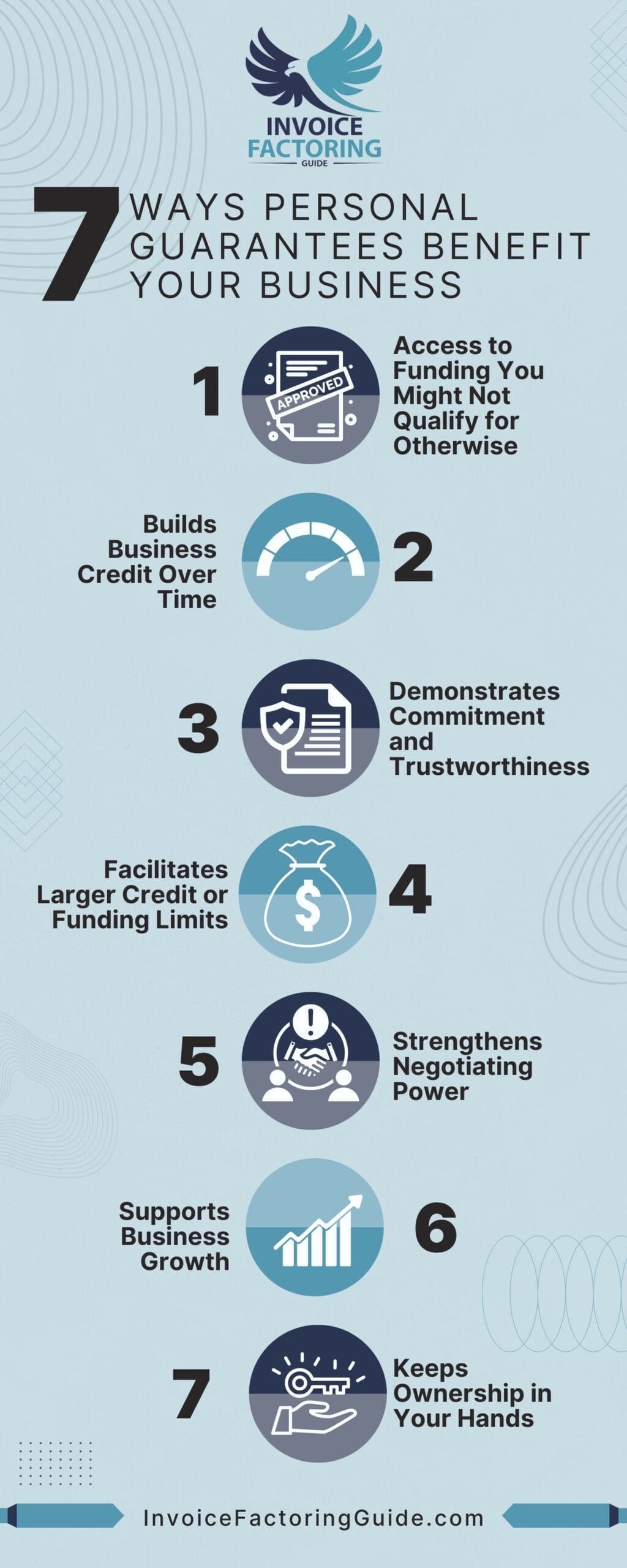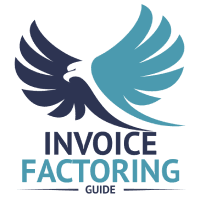
Did you know that personal guarantees are required in nearly half of all loans offered to small and mid-sized businesses, according to research from Pepperdine University? Even though factoring isn’t a loan, it’s a popular funding method and part of the broader landscape of business financing, where personal guarantees are a common feature.
For many business owners, this is less about taking on new risks and more about formalizing responsibilities you may already have, depending on your business structure. Factoring firms use personal guarantees to balance risk while helping businesses like yours unlock vital cash flow. Below, we’ll explore how a personal guarantee in factoring works and how to get a tailor-fit factoring agreement regardless of which path you choose.
What is a Personal Guarantee?
A personal guarantee is a legal promise you make as an individual to take responsibility for a financial obligation if your business or another party cannot fulfill it. It’s your personal commitment to repay the debt or cover a loss, even if the primary borrower defaults.
Common Situations Where Personal Guarantees Are Used
Personal guarantees are not unique to factoring. They pop up in many scenarios where lenders or companies want an extra layer of assurance.
- Small Business Loans: If your business is new or lacks credit history, lenders often require a personal guarantee before extending a loan.
- Leases: Signing a lease for office or retail space? Landlords may ask for a personal guarantee to ensure rent payments if your business falls behind.
- Supplier Agreements: Suppliers offering large amounts of credit for inventory or equipment might require you to guarantee repayment personally.
How Personal Guarantees Work
Personal guarantees create a bridge between your business’s funding needs and a lender’s trust. By signing one, you agree to personally support your business’s financial obligations, offering the lender added confidence to extend funding.
This doesn’t mean you’re immediately liable for everything. It’s typically a safeguard used in specific cases, like invoice non-payment or disputes. Many businesses, especially LLCs or partnerships, may already have inherent personal liability depending on their structure, making a formal guarantee more of a confirmation than a change in responsibility.
Types of Personal Guarantees
Not all personal guarantees are the same. Here’s a quick overview.
- Unlimited Personal Guarantee: This means you’re personally responsible for the entire amount owed, including interest, fees, and other costs.
- Limited Personal Guarantee: This caps your liability at a specified dollar amount or percentage of the debt.
- Joint and Several Guarantees: In partnerships or multiple-owner situations, each guarantor can be held fully liable for the entire obligation, regardless of who caused the default.
Benefits of a Personal Guarantee for Your Business
While a personal guarantee involves taking on some personal responsibility, it can open doors to valuable opportunities for your business. Here are the key benefits.
- Access to Funding You Might Not Qualify for Otherwise: A personal guarantee reassures lenders or partners, making it easier for newer or smaller businesses to secure loans, leases, or other financing.
- Builds Business Credit Over Time: Successfully fulfilling obligations tied to a personal guarantee can help your business establish or improve its credit profile, reducing the need for personal guarantees in the future.
- Demonstrates Commitment and Trustworthiness: By offering a personal guarantee, you show that you’re personally invested in your business’s success, which can enhance trust with lenders, suppliers, or partners.
- Facilitates Larger Credit or Funding Limits: Lenders may be more willing to extend higher credit limits or larger funding amounts when a personal guarantee is in place.
- Strengthens Negotiating Power: Agreeing to a personal guarantee can sometimes lead to better terms, such as lower interest rates or fees because it reduces the lender’s risk.
- Supports Business Growth: By enabling access to resources like funding or leases, a personal guarantee can provide the capital or equipment needed to grow your operations.
- Keeps Ownership in Your Hands: Unlike equity financing, a personal guarantee doesn’t require giving up a stake in your business, allowing you to maintain full control.
Personal Guarantee vs. Validity Guarantee
A personal guarantee and a validity guarantee sound similar, but they serve different purposes in financial agreements. A personal guarantee is a broader commitment where you agree to cover a financial obligation if your business or another party can’t pay, offering lenders additional assurance. A validity guarantee, on the other hand, is more specific—it confirms that the information or assets backing the agreement, such as invoices or collateral, are legitimate and accurate. While personal guarantees involve a personal pledge, validity guarantees focus only on protecting against issues like fraud or misrepresentation. Both are common in financial agreements, helping to build trust and secure funding opportunities.
The Role of a Personal Guarantee in Factoring
When it comes to factoring, personal guarantees are a common practice designed to protect the factoring company while helping your business secure funding. Factoring involves selling your invoices to a factoring firm in exchange for immediate cash, but because the firm takes on the risk of your customers not paying, a personal guarantee acts as an added layer of assurance.
Why a Factoring Firm Might Require Personal Guarantees
Factoring firms face unique risks, and a personal guarantee helps mitigate these. Here’s how it ties into the process.
- Protecting Against Non-Payment: If your customers don’t pay their invoices for reasons like insolvency or disputes, the factoring company may require you to step in to cover the shortfall.
- Guarding Against Fraud or Invalid Invoices: Factoring companies rely on the legitimacy of your invoices. A personal guarantee ensures you’re accountable if invoices are fraudulent or misrepresented.
- Helping New or Smaller Businesses: Many businesses that turn to factoring are newer or have inconsistent cash flow. A personal guarantee gives factoring companies the confidence to fund businesses that might not otherwise qualify.
How it Works in Practice
- Standard in Recourse Factoring: Most factoring agreements are “recourse” arrangements, meaning the factoring company can seek repayment from you if your customers don’t pay. The personal guarantee strengthens this agreement.
- Linked to Specific Risks: The personal guarantee doesn’t necessarily apply to all risks. For example, in a “non-recourse” agreement, the factoring company absorbs the risk of customer insolvency, but the guarantee may still cover issues like fraud or breach of contract.
- Limits and Negotiations: Depending on your business’s creditworthiness, some factoring firms may offer limited personal guarantees or even waive them entirely for established businesses with reliable customers.
Benefits of a Personal Guarantee in Factoring
Though it may feel like an added risk, a personal guarantee in factoring can benefit your business in many ways.
- Expedited Funding: Offering a personal guarantee can speed up the approval process, giving you faster access to cash flow.
- Flexible Financing Option: Factoring with a personal guarantee is often more accessible than traditional loans, especially for small or new businesses.
- Strengthens Partnership with the Factor: By agreeing to a personal guarantee, you build trust with the factoring company, which can lead to more favorable terms or a long-term relationship.
Alternatives to Personal Guarantees in Factoring

While personal guarantees are common in factoring agreements, they’re not the only way to secure funding. Depending on your business’s creditworthiness, financial stability, or the factoring company’s policies, there may be alternatives that reduce or eliminate the need for a personal guarantee.
Non-Recourse Factoring
In a non-recourse factoring agreement, the factoring company assumes the risk of customer non-payment due to insolvency. This reduces the need for a personal guarantee, although other risks, such as invoice disputes or fraud, may still require guarantees or additional measures.
Higher Fees or Lower Advance Rates
To offset the risk of not requiring a personal guarantee, the factoring company might charge higher fees or reduce the percentage of the invoice value advanced upfront. For instance, you may be offered 75 percent of an invoice’s value upfront rather than 85 percent.
Strong Customer Creditworthiness
If your customers have a proven track record of paying on time and strong credit ratings, factoring companies may feel confident enough in the quality of the receivables to waive the personal guarantee. However, this is more likely for businesses working with large, reputable clients rather than a mix of smaller or unknown customers.
Corporate Guarantee
Instead of you personally guaranteeing the agreement, the business itself provides a guarantee backed by its assets, such as inventory, equipment, or real estate.
Collateral
Providing collateral, such as equipment, real estate, or other tangible assets, can reduce or eliminate the need for a personal guarantee. However, collateralized agreements often involve additional paperwork and valuations, which can delay funding.
Stronger Terms and Conditions
Some factoring companies may waive the personal guarantee in exchange for stricter terms, such as shorter invoice repayment periods, higher fees for late payments, or a more detailed vetting process.
Get a Tailor-Fit Factoring Agreement
Factoring companies understand that no two businesses are exactly alike, so they’ll often work with businesses to develop a factoring agreement that aligns with their unique needs. To be matched with a factoring company that can help you find your ideal factoring fit, request a complimentary rate quote.
Personal Guarantee in Factoring FAQs
Why do lenders or factoring companies require a personal guarantee?
A personal guarantee reduces risk by ensuring the lender or factoring company gets paid, even if your business defaults. It shows your commitment to the agreement and provides an extra layer of security, especially for businesses with inconsistent cash flow or limited credit.
Are personal guarantees common in factoring agreements?
Yes, personal guarantees are standard in factoring, particularly for small businesses or startups. They ensure the factoring company is protected against risks like non-payment or invoice disputes, which are common in receivables financing.
What are the risks of signing a personal guarantee?
The primary risk is personal liability—you may need to use personal assets to cover the debt if your business defaults. However, understanding the terms and negotiating limits can help mitigate these risks.
How is a validity guarantee different from a personal guarantee?
A validity guarantee ensures the invoices or assets in the agreement are legitimate. A personal guarantee, in contrast, makes you liable for the entire financial obligation, even beyond issues of fraud or misrepresentation.
Can I negotiate a factoring agreement without a personal guarantee?
Yes, it’s possible. Alternatives include non-recourse factoring, collateral, or proving strong customer credit. Discuss options with your factoring company to find terms that suit your needs.
What are the benefits of a personal guarantee for my business?
It can unlock funding, improve business credit, and demonstrate commitment. Personal guarantees often lead to better terms, like lower fees or higher funding limits.
Do all factoring companies require personal guarantees?
No, not all do. Some waive guarantees for businesses with strong credit or reliable customers. Others may offer non-recourse factoring or require collateral instead.
How does a personal guarantee improve risk management in factoring agreements?
A personal guarantee helps the factoring company manage risks by ensuring repayment, reducing the impact of customer defaults or disputes.
What role do personal guarantees play in ensuring secure payments in factoring?
Personal guarantees provide assurance to factoring companies that obligations will be met, creating a more secure payment process for all parties.
Can a personal guarantee help build trust with clients and financial partners?
Yes, offering a personal guarantee shows your commitment to honoring agreements, fostering trust with clients and financial partners. It demonstrates reliability and strengthens relationships.

About Invoice Factoring Guide
Related Articles
Get an instant funding estimate
Results are estimates based on the calculated rate and the total invoice amount provided.
Actual rates may vary.
Request a Factoring Rate Quote
PREFER TO TALK? Call us at 1-844-887-0300










